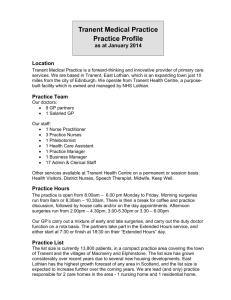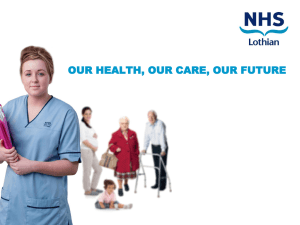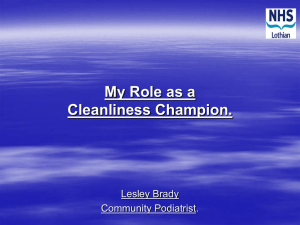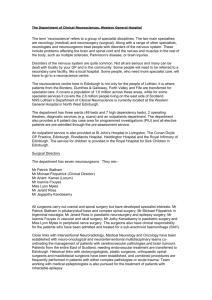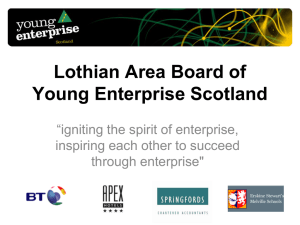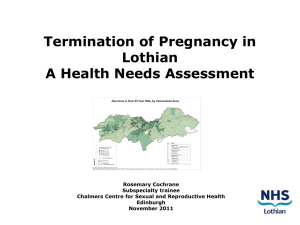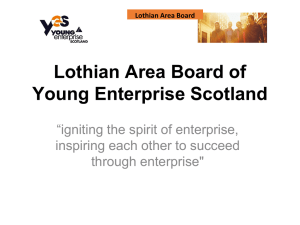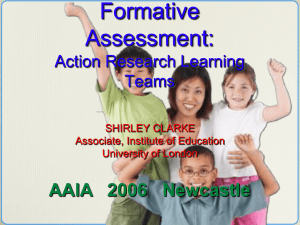NHS Lothian Children`s Services Department of Community Child
advertisement
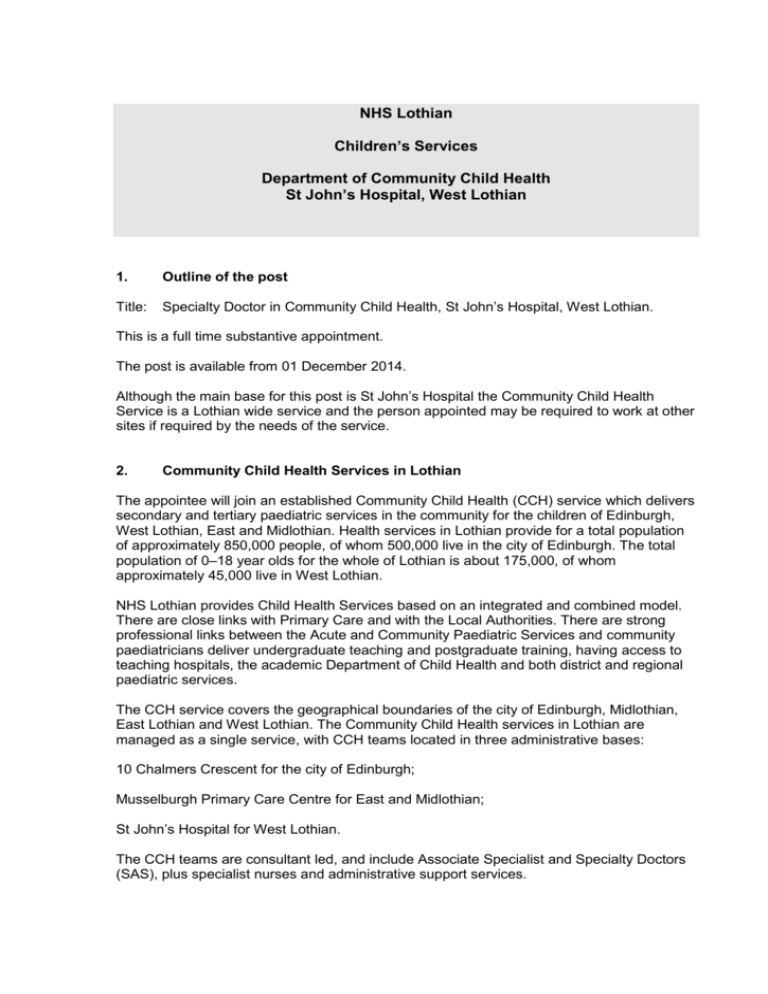
NHS Lothian Children’s Services Department of Community Child Health St John’s Hospital, West Lothian 1. Outline of the post Title: Specialty Doctor in Community Child Health, St John’s Hospital, West Lothian. This is a full time substantive appointment. The post is available from 01 December 2014. Although the main base for this post is St John’s Hospital the Community Child Health Service is a Lothian wide service and the person appointed may be required to work at other sites if required by the needs of the service. 2. Community Child Health Services in Lothian The appointee will join an established Community Child Health (CCH) service which delivers secondary and tertiary paediatric services in the community for the children of Edinburgh, West Lothian, East and Midlothian. Health services in Lothian provide for a total population of approximately 850,000 people, of whom 500,000 live in the city of Edinburgh. The total population of 0–18 year olds for the whole of Lothian is about 175,000, of whom approximately 45,000 live in West Lothian. NHS Lothian provides Child Health Services based on an integrated and combined model. There are close links with Primary Care and with the Local Authorities. There are strong professional links between the Acute and Community Paediatric Services and community paediatricians deliver undergraduate teaching and postgraduate training, having access to teaching hospitals, the academic Department of Child Health and both district and regional paediatric services. The CCH service covers the geographical boundaries of the city of Edinburgh, Midlothian, East Lothian and West Lothian. The Community Child Health services in Lothian are managed as a single service, with CCH teams located in three administrative bases: 10 Chalmers Crescent for the city of Edinburgh; Musselburgh Primary Care Centre for East and Midlothian; St John’s Hospital for West Lothian. The CCH teams are consultant led, and include Associate Specialist and Specialty Doctors (SAS), plus specialist nurses and administrative support services. The Department is working towards an equitable service for children throughout Lothian. The CCH service invested in a modernisation project between 2010 and 2012, to clarify the role of CCH and improve the efficiency of service delivery across Lothian. The project defined CCH core business and key performance indicators, reviewed patient pathways, determined a unified DNA policy and criteria for reviewing children. Two main work streams were identified: Neurodisability o Children with Physical Disability o Children with Learning Difficulties o Children with Communication Disorders, including Autistic Spectrum Disorders. o Children with Sensory Impairment o Children with Additional Support Needs, in mainstream and Special Schools Vulnerable Children o Child Protection service o Looked After Children, including the VALAC clinic (Vulnerable and Looked After Children) and the permanency process. o Social vulnerability. The Department has good working relationships with education, social work, the police force and the voluntary sector. Clinical practice is supported by long term and extensive experience using a computerised Support Needs System database which contains between 2,500-3,000 children with additional support needs, the majority of whom have a neurodisability. This affords excellent opportunities for audit and research. Pre-school multidisciplinary child development clinics are delivered in the Royal Hospital for Sick Children (RHSC), in four geographical localities in the city of Edinburgh and in East and Midlothian. West Lothian has a fully equipped Child Development Centre delivering preschool multidisciplinary clinics and specialist clinics. The child protection service is based within Community Child Health and provides health input into interagency referral discussions (IRDs) with senior police and social work colleagues for all children where concerns about any form of abuse or neglect have been raised. Where indicated, comprehensive medical assessments, specialist medical examinations and joint paediatric forensic examinations are carried out urgently or electively through regular SCAN clinics at RHSC, St John’s Hospital or at a police facility. The child protection team includes Child Protection Advisors (CPAs), SAS doctors, paediatricians in training and Consultant Paediatricians. From May 2013, the service has been delivered on a Lothian wide basis, with IRDs being conducted in the three bases by CPAs, trainees and/or SAS doctors, supervised by a consultant paediatrician for the Lothian region. A 24/7 out of hours service for Child Protection is delivered by CCH consultant paediatricians. The school health service is nurse led, with secondary level care provided by community paediatricians. There are a number of Special Schools across Edinburgh, East, Mid and West Lothian, supported by school nurses, paediatric therapists, SAS doctors and consultants. The specialist services led by consultants within the CCH Department include: Child Development Physical Impairment including neurodisability Communication Disorders including Autistic Spectrum Disorders Child Protection Looked After and Accommodated Children Learning Disability Visual Impairment Hearing Impairment Children with complex and exceptional healthcare needs Lothian CCH Workforce Currently, there are 13 Consultants (11.5 WTE), 14 Associate Specialists (10.4 WTE) and 11 Specialty Doctors (8.3 WTE) in post in the Lothian CCH Department. In addition to the permanent staff, junior doctors in training from paediatric and GP training programmes are attached to CCH for clinical experience and training under the guidance of a named clinical supervisor. Lothian CCH Consultants: Dr Alexandra Baxter Dr Anna Chillingworth Dr Sarah Clegg Dr Lyn Cresswell Dr Helen Hammond Professor Anne O’Hare Dr Dayeel Goh Dr Susan Kidd Dr Charlotte Kirk Dr Shabana Khalid Dr Lindsay Logie Dr Lesley Ross Dr Jill Yates Consultant Paediatrician, interest in Neurodisability Consultant Paediatrician, interest in Neurodisability Consultant Paediatrician, interest in Neurodisability including Communication Disorders Consultant Paediatrician, interest in Visual Impairment Consultant Paediatrician, interest in Child Protection Consultant Paediatrician, interest in Neurodisability including Communication Disorders Consultant Paediatrician (East Lothian) Consultant Paediatrician, interest in Vulnerable Children (West Lothian/Edinburgh) Consultant Paediatrician, interest in Vulnerable Children Consultant Paediatrician, interest in Neurodisability (West Lothian/Edinburgh) Consultant Paediatrician (Midlothian) and Lead Paediatrician for Child Protection (Lothian). Consultant Paediatrician Consultant Paediatrician, interest in Neurodisability (West Lothian) Lothian CCH SAS Doctors: Dr Sonia Bank-Theilen Dr Jacqueline Bell Dr Elaine Crummey Dr Elaine Dale Dr Jillian Dawson Dr Jennifer Glen Dr Jane Hailey Dr Sheila Halpin Dr Ruth Henderson Dr Kemal Ibrahim Dr Jennifer James Dr Sheila Kernohan Dr Naomi Kerr Dr Joanne Kilpatrick Dr Rosemary Jones Specialty Doctor Specialty Doctor Associate Specialist Associate Specialist Specialty Doctor Associate Specialist Associate Specialist Associate Specialist Associate Specialist Specialty Doctor Specialty Doctor Specialty Doctor Associate Specialist Associate Specialist Associate Specialist Dr Jennifer Mackenzie Dr Heather Marshall Dr Helen MacInnes Dr Lisa McClelland Dr Stephen Meldrum Dr Liza Neville Dr Joan Ritchie Dr Fiona Sandeman Dr Catherine Scrutton Dr Soundara Somasundaram Associate Specialist Associate Specialist Associate Specialist Specialty Doctor Specialty Doctor Specialty Doctor Associate Specialist Specialty Doctor Specialty Doctor Associate Specialist Community Child Health Department at St John’s Hospital The CCH Service forms part of a combined hospital and community paediatric service, with the CCH team based in the Department of Community Child Health within St John's Hospital, Livingston. The CCH specialist and assessment clinics for pre-school children are delivered at Beatlie Child Development Centre in Livingston. Historically, the SAS doctors have delivered clinical services to school aged children in the primary and secondary schools of West Lothian. This service is currently in a state of transition, moving to clinics delivered in local health centres from September 2014. All SAS doctors contribute to the West Lothian Child Protection service, participating in a daytime rota for Interagency Referral Discussions with Police and Social Work during office hours (Monday to Friday 0900 – 1700hrs). As part of a further modernisation project reviewing the Lothian Child Protection service, the current model of IRD service delivery is being evaluated, with possible centralisation of the Lothian IRD service in the future. This would require the West Lothian SAS doctors to travel to Edinburgh. The SAS doctors are encouraged to develop an area of specialist interest. Current SAS specialist responsibilities include Autistic Spectrum Disorder, Severe Emotional and Behavioural Needs, Adoption and Fostering, children with Visual or Hearing Impairment and pre-school Developmental Paediatrics. All SAS doctors are also expected to contribute to the wider responsibilities of the department, such as undergraduate teaching, trainee case supervision, organisation of in-service training days, rota master duties and representing CCH on relevant working groups. Departmental staffing The Community Child Health medical team currently comprises: Dr Jill Yates, Consultant Paediatrician, based in West Lothian. Dr Susan Kidd, Consultant Paediatrician, based in West Lothian and Edinburgh. Dr Shabana Khalid, Consultant Paediatrician, based in West Lothian and Edinburgh. There are 4 (2.2 WTE) Associate Specialists and 4 (3.1 WTE) Specialty Doctors. This is a replacement post for one of the Specialty Doctor posts. One paediatric trainee who is on rotation from the South East Scotland training programme. Child Protection Advisors, Looked After Children Nurses and School Nurses also play an important role in the work of the department. Child Development Centre The Child Development Centre is a joint Education and Health initiative that provides a focus for services for pre-school children with any form of developmental delay and all forms of neurological disability. Consultant led multi-disciplinary clinics are run on a weekly basis including clinics for the assessment and management of autistic spectrum disorders, and specialist outreach services e.g. for sensory impairment. Therapy, nursing and education colleagues provide a range of group activities tailored to the needs of the current caseload. 3. Duties of the Post 3.1 Clinical Duties The post holder is expected to work as part of a consultant led team to deliver daytime CCH services to the children of West Lothian. This involves: Contribution to the Lothian child protection service o Participation in the IRD rota. o Attendance at Child Protection Case Conferences (CPCCs). o Preparation of reports for CPCCs. o Delivery of child protection medical examinations. Delivery of CCH clinics to school aged children. Delivery of CCH clinics to pre-school aged children. Delivery of CCH services to meet the health care needs of children with additional support needs, both in mainstream and in Special Schools. Assessment of children in VALAC clinic. Development of a special interest. Participation in weekly allocation meeting, triaging referrals. Contribution to CCH service developments. There is no out of hours commitment. The post holder is expected to participate in NHS Lothian’s medical staff appraisal process and the General Medical Council’s revalidation process. If further training or development to allow the post holder to fulfil the commitments in the job description is required, this will be discussed and planned with the post holder. 3.2 Continuing Professional Development (CPD). The Specialty Doctor will be expected to maintain his/her professional knowledge and competencies and participate in an accredited CPD scheme, according to the requirements of the General Medical Council. 3.3 Conditions Annual leave and study leave allowances are in line with NHS Lothian Specialty Doctor Terms and Conditions. This is an exposure prone post and evidence of the relative immunities will be required by the Occupational Health Service before permission to start work is given. 4. NHS Lothian NHS Lothian is an integrated NHS Board in Scotland providing primary, community, mental health and hospital services. Mr Tim Davison is the Chief Executive and Dr David Farquharson is the Medical Director. The NHS Board determines strategy, allocates resources and provides governance across the health system. Services are delivered by Lothian University Hospitals Division, the Royal Edinburgh Hospital and Associated Mental Health Services, four Community Health Partnerships in Edinburgh, West Lothian, East Lothian and Midlothian, and a Public Health directorate. University Hospitals The University Hospitals Division provides a full range of secondary and tertiary clinical services to the populations of Edinburgh, Midlothian, East Lothian and West Lothian. The Division is one of the major research and teaching centres in the United Kingdom. Hospitals included in the Division are: The Royal Infirmary of Edinburgh The Western General Hospital The Royal Hospital for Sick Children, Edinburgh St John’s Hospital Liberton Hospital The Princess Alexandra Eye Pavilion. The Royal Infirmary (RIE) is a major teaching hospital on a green field site in the South East of the city of Edinburgh built in 2003. It comprises 25 wards, 869 beds, and 24 operating theatres, and is equipped with modern theatre and critical care equipment and monitoring. Within the main building is a dedicated, multidisciplinary, five-theatre day surgery complex. The hospital provides for most specialities and is the centre for: General surgery Vascular surgery Hepatobiliary and transplant medicine and surgery Cardiac and thoracic surgery Elective and trauma orthopaedics surgery Neonatology Obstetrics & Gynaecology Cardiology Renal medicine Sleep medicine Accident and Emergency. There is a Combined Assessment Unit (CAU) which takes unselected GP or direct emergency referrals, and from A&E. The CAU includes the Dept of Liaison Psychiatry and the Scottish Poisons Bureau and Treatment Centre. There are full supporting Laboratory and Diagnostic Radiology Services (including CT, MR, Ultrasound and NM and PET scanning). There is a full range of lecture theatres, a library and AV facilities. The Western General Hospital (WGH) has 600 beds and is equipped with modern theatre and critical care equipment and monitoring. The Anne Ferguson building was completed in 2001. The hospital provides for most specialties and is the centre for: Neurology, neurosurgery and neuropathology UK CJD unit Colorectal surgery Urology and Scottish Lithotriptor Centre Breast surgery and breast screening Gastroenterology Rheumatology Infectious diseases Haematology and oncology Medical oncology Radiation oncology Dermatology (Inpatient) Medicine of the Elderly and Stroke Medicine There is an Acute Receiving Unit, which accepts GP referrals and 999 ambulance medical cases on a zoned basis within the city, and a nurse led Minor Injuries Unit. There is no trauma unit. There are full supporting Laboratory and Diagnostic Radiology Services (including CT, MR, Ultrasound and NM).There is a full range of lecture theatres, a library and AV facilities. St John’s Hospital opened in 1989 and is located in the centre of Livingston, about 30 minutes drive west from Edinburgh. The hospital provides most specialties but does not have emergency general surgery or orthopaedic trauma operating. The hospital has a paediatric ward and is a centre for: General Medicine with specialists in Cardiology, Diabetes & Endocrinology, Gastroenterology, Respiratory Medicine and Care of the Elderly Obstetrics & Gynaecology Child Health including paediatrics and community child health The regional Burns and Plastic Surgery unit for SE Scotland Oral and Maxillofacial Surgery ENT Critical Care (ITU, HDU and CCU) Accident and Emergency General Surgery Orthopaedics Mental Health including ICCU and ICPU Recent developments at SJH include a new endoscopy suite, an Intensive Psychiatric Care Unit, a digital mammography unit, an oncology (cancer care) day centre, a satellite renal dialysis unit and a £2.75m reprovision of A&E. There are full supporting Laboratory and Diagnostic Radiology Services (including CT, Ultrasound and NM). The hospital has been accredited full teaching hospital status by the University of Edinburgh. There is a full range of lecture theatres, a library and AV facilities. The Royal Hospital for Sick Children (RHSC) is a 141 bedded hospital providing general and specialist services for children. The hospital is situated in a residential area close to the centre of Edinburgh and is approximately three miles from the site of the New Royal Infirmary and the co-located University of Edinburgh Medical School and three miles from the Western General Hospital. The RHSC is the main paediatric teaching hospital for the South-East of Scotland providing general and specialised services on a local, regional and national basis. It acts as the local paediatric referral centre for the children of Edinburgh and surrounding areas, and as a tertiary referral centre for intensive care patients; gastroenterology, hepatology & nutrition; respiratory medicine; cardiology; nephrology; neurology; oncology; haematology; neonatal surgery; plastic surgery; orthopaedic surgery; urological surgery and all aspects of general surgery. Hospital accommodation encompasses five theatres, a critical care unit comprising an eightbedded Paediatric Intensive Care Unit, six-bedded High Dependency Unit and a threebedded Neonatal Intensive Care Unit. There is an excellent library facility and a modern lecture theatre with a full range of audio-visual equipment. All services are supported by comprehensive radiology, neurophysiology, laboratory and therapy services. The local radiology department provides on site Magnetic Resonance Imaging, CT Scanning, nuclear scanning and ultrasound. Community Healthcare Partnerships The four established Lothian Community Health (and Social Care) Partnerships serve the population of Edinburgh, Midlothian, East Lothian and West Lothian. Hospitals in the CH(C)Ps include: The Astley Ainslie Hospital in Edinburgh Midlothian Community Hospital Herdmanflat Hospital in East Lothian Roodlands Hospital in East Lothian. The four CHPs are co-terminous with Edinburgh, Midlothian, East Lothian and West Lothian Councils bringing together those responsible for planning, managing and providing community-based health services for the population of Edinburgh and the Lothians. There are 7,500 members of staff. In addition, there are approximately 1,000 independent contractors in General Medical and Dental Practice, as well as pharmacists and opticians. A population of 850,000 people is served across Lothian health board area. The range of services include care of the elderly, medical rehabilitation, community mental health, substance misuse and learning disability, district nursing and health visiting, family planning, well woman, comprehensive dental care and those provided by Allied Health Professionals, such as physiotherapists, pharmacists and optometrists. Specialist services provided include brain injury rehabilitation, bio-engineering and prosthetics, drugs and alcohol misuse and harm reduction, AIDS/HIV and Child and Adolescent Mental Health Services. Royal Edinburgh Hospital and Associated Services The Royal Edinburgh and Associated Services provide a range of Mental Health services to the population of Lothian and other Boards within Scotland. The Royal Edinburgh Hospital is located on the south side of the City of Edinburgh. It comprises some 20 wards, 420 beds, day hospitals and outpatient facilities. The hospital provides the following range of specialities:Acute Mental Health Rehabilitation Psychiatric Emergency Team 24/7 Outpatients Assessment Psychiatry of Old Age Forensic Medium Security Unit Inpatient facilities for under 18s Psychotherapy Service Psychology Services Services for Eating Disorders Day Hospitals – Psychiatry of Old Age The hospital is currently housed in a mix of accommodation ranging from 19th century to present. There is a major project in place to take forward a reprovisioning programme in line with the strategic vision with the “Delivery for Mental Health” (Scottish Executive 2006). Department of Public Health Medicine The aim is to improve the health of the people of Lothian in collaboration with many other partners. Using a range of knowledge, experience and networking capability, distinctive contributions are: the promotion of specific measures to monitor and improve health; the collation and interpretation of health related information. The following objectives have been agreed as the basis for the Department’s work plans: 1. To monitor the health status and health needs of people in Lothian; 2 To promote improvements in the health of Lothian people directly, and by providing information and advice to the public on health matters; 3. To assist Lothian NHS Board to fulfil its statutory obligations; 4. To contribute to strategic changes within the NHS in Lothian by providing information on clinical effectiveness; 5. To facilitate improvements in health and health care services directly, and through ‘managed clinical networks’ and wider alliances; 6. To contribute on a 24 hour basis to the control and prevention of communicable diseases and environmental hazards; To maintain commitments to teaching, training, professional development, audit and research. To enable efficient management of the Department, there are four groups in the Directorate; Healthy Communities, Healthcare, Health Protection and Health Information. 5. University of Edinburgh The University of Edinburgh was established in 1582 and is one of the largest in the United Kingdom located on a number of prominent sites in Scotland’s capital city. It is Scotland’s premier research university, graded within the top six multi-faculty British Universities in the last national research assessment exercise (90 percent of its academic staff were in units rated 4, 5 or 5*). It has 3,000 academic staff, over 16,000 undergraduate and over 4,000 postgraduate students and an annual expenditure of over £261M for teaching and research. The University is organised into 3 Colleges: Humanities and Social Science, Medicine and Veterinary Medicine, Science and Engineering. 6. NHS Library and Postgraduate Facilities There are excellent facilities on all sites. 7. Research and Development The University of Edinburgh and Medical School have an outstanding reputation for teaching and research and are very closely associated with NHS Lothian. Within the university structure, the Section on Child Life and Health is based at 20 Sylvan Place, in close proximity to Paediatric Neurology and the Community Child Health Department and forms part of the Division of Reproductive and Developmental Sciences. Community Child Health enjoys excellent clinical and academic links with other Allied Health Professionals and the Universities of Queen Margaret University College and Napier University have large undergraduate and postgraduate programmes for nursing and AHPs. 8. Teaching Participation in Undergraduate and Postgraduate paediatric teaching and examination. Participation in multi-agency teaching and training. Provision and training of newly appointed medical staff and trainees 9. Indicative Job Plan Specialty: Principal place of work: Community Paediatrics Community Child Health Department, St John’s Hospital, West Lothian. Contract: Full Time Programmed activities: 10 PA – 9.0 DCC; 1.0 SPA On call: N/A Managerially accountable to: Lead Professional, Community Child Health and Associate Medical Director, Women’s and Children’s Services, NHS Lothian. Day Location Type of work DCC Monday 09.00 – 13.00 CCH, St John’s Child protection IRDs 1.0 13.00 -17.00 CCH, St John’s Child protection IRDs Clinical administration 1.0 Community Health Clinic CCH clinic 1.0 CCH, St John’s Staff meeting (monthly) Multiagency meetings (CPCCs/GIRFEC CPM) Clinical administration 1.0 Community Health Clinic/ Special school VALAC clinic (alt weeks) Special school clinic (alt weeks) 1.0 13.00-17.00 Thursday 09.00 - 13.00s CCH Core SPA Community Health Clinic CCH clinic 1.0 13.00 - 17.00 CCH/other venue Allocation meeting Clinical administration 1.0 Friday 09.00–13.00 CCH, St John’s Clinical administration 1.0 13.00–17.00 CCH, St John’s Child Protection IRDs (alt weeks) Clinical administration 1.0 Tuesday 09.00 - 13.00s 13.00 - 17.00 Wednesday 09.00-13.00 Saturday Sunday SPA 1.0 10. Further information For further information and arrangements to visit, please contact: Dr Lesley Ross, Consultant Paediatrician, Department of Community Child Health, 10, Chalmers Crescent, Edinburgh EH9 1TS Tel: 0131 536 0471 email: lesley.ross@luht.scot.nhs.uk Dr Edward Doyle, Associate Medical Director, Women’s and Children’s Services, NHS Lothian Tel: 0131 536 0007 email: edoyle2@nhs.net 11. Person Specification NHS Lothian - University Hospitals Division Person Specification Post: Specialty Doctor - Community Child Health Division: Children’s Services Location: RHSC Requirements Essential 1. Qualifications Fully registered with the General Medical Council. License to practice Desirable MRCPCH / DCH 2. Training Minimum of four years post-qualification full time training or equivalent. Minimum of two years of full time or equivalent paediatric training. 3. Clinical experience in specialty/subspecialty A range of clinical experience and competence in general paediatric medicine. Level 1 Child Protection training. Experience in Community Child Health Level 2 Child Protection training 4. Research Evidence of an understanding of the principles and practice of medical research. Experience of medical research 5. Teaching Experience in training undergraduate medical students. Experience in training postgraduate doctors 6. Audit Demonstrable experience of participation in clinical audit and the implementation of its findings. 7. Management Understanding of current issues and priorities in the NHS. 8. Interpersonal skills Demonstrable skills in working with children and families. Well organised Good time management skills. Effective interpersonal skills. Demonstrable ability to relate to and work within a team. Good oral and written communication skills Flexible and adaptable.
